Going to Paris? Don’t Speak French?
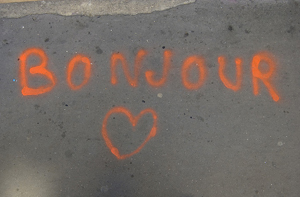
- SUBSCRIBE
- ALREADY SUBSCRIBED?
BECOME A BONJOUR PARIS MEMBER
Gain full access to our collection of over 5,000 articles and bring the City of Light into your life. Just 60 USD per year.
Find out why you should become a member here.
Sign in
Fill in your credentials below.
 Going to Paris?
Going to Paris?
Don’t speak French?
No Problem.
No. Really!
Relax.
Most of the preparation is about attitude adjustment. Attitude is very French and is the same word in French as English, by the way. But you say you don’t speak French? Get over it. Zillions of other visitors to Paris don’t either and everyone seems to be eating and sightseeing, shopping and sleeping without speaking much French. Like I said: relax.
You will be ahead of the game, however, if you learn just a few words. And if you do that, everyone will be impressed that you at least tried and they’ll usually be nice to you because of it.
Most people already KNOW at least 5 French words, not even counting attitude. Here are some you may also be surprised that you know.
1. Oui – “wee” Yes. Yes! One down.
2. Non — Pronounced “nohn,” much the same as English – really. Okay you can add a nasal n after the o, but say it fast and nicely and you’ll fool almost everyone even without the nasal n.
3. Moi — You’ve heard Miss Piggy say it many times. It means “me.” So that’s moi, (moowah) as in donnez moi une (dough nay, moowah oon — give me a…) croissant.
Ah, there’s another word you already know! Pronounce it qua sont and enjoy.
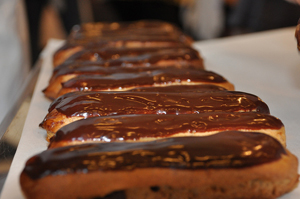 4. Eclair — OMG what a word to know! That e is like “a” as in ate and clare as in dare – eclair. In Paris, they will mostly be filled with dreamy custard.
4. Eclair — OMG what a word to know! That e is like “a” as in ate and clare as in dare – eclair. In Paris, they will mostly be filled with dreamy custard.
5. Merci – “Thank you” — the word that you should and will use the most. Pronounce it mare sea (as in momma horse and swallow the r… and sea (as in ocean). Add “beaucoup” (bo koo) after merci and it means thank you very much, words you will want to know after you have tasted that Parisian éclair!
You also already know a few more words. Words such as avenue, boulevard, madame and tour. Then there’s delicious soupe (you eat it with a spoon and pronounce it exactly the same way in English). Grande — make the “a” sound like “ah” and you’ve got the word for large. The opposite is petite — it’s a “small” word, er, world. Art, as in what Picasso created. And the French also gave us the beret (bare-ay) to wear jauntily and the cabaret to enjoy happily.
Now you have the start of a vocabulary (vo-cab-you-lair in French). This is easier than you thought, right?
Now add a few more words.
Please say “s’il vous plait” whenever you can and everyone around you will be pleased. You’ve seen it on formal invitations of course, haven’t you? A very useful and appreciated phrase, it is pronounced “see voo play.” Child’s play, really. And handy. ALWAYS use it if you want something and you’ll get it if you do, believe me.
Pardon is the polite thing to say when you bump into someone, want to get someone’s attention or if you don’t understand what a person is saying to you. Pronounce it par, as in car, and don, as in cone.
Say “Hello” with “bon jour,”(bone joor) and in the late afternoon and evenings, “bon soir” (bone su ar).
Listen to how Parisians around you say these words and you’ll have the right accent quickly because you will hear every shop keeper and greeter at restaurants say it as soon as you walk in. That goes for all the other words we’ve explored as well. Listen and learn.
“Ooo la la” is equivalent to OMG!
OMG, now you have learned enough French to be polite and have a good time relaxing about the rest of those more difficult to pronounce words.
For more help, many small phrase books can help. Do not expect to have long-reaching political conversations after you have memorized any of the material in such books. They are survival-through-language books, not Sorbonne courses in diplomacy.
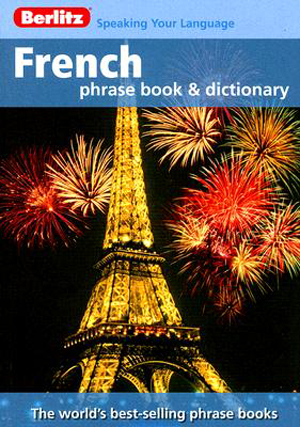 Among the good phrase books is the industry standard Berlitz’ French Phrase Book and Dictionary. A well-organized, easy to follow little book that will cost around $9 and fit into your raincoat pocket. Different colored sections give you words for everything from toilettes to flowers (fleurs) and much in between,
Among the good phrase books is the industry standard Berlitz’ French Phrase Book and Dictionary. A well-organized, easy to follow little book that will cost around $9 and fit into your raincoat pocket. Different colored sections give you words for everything from toilettes to flowers (fleurs) and much in between,
If you are under the age of 25, you will appreciate Lonely Planet’s $6 Fast Talk French Phrase Book. It offers phrases for expressions “no worries!” (pas de soucis – pah duh soo sea); “cool” (genial – jay nee-ahl) and too bad (tant pis – tawnt peace), the last a phrase some older people might consider a little vulgar, but would be common parlance to young people.
Rick Steves’ French Phrase Book and Dictionary ($9-$12) is slightly dry and contains $20 phrases such as the absolutely correct “Pouvez vous parler plus lentement?” for “Will you speak more slowly,” but the simpler “lentement, s’il vous plait” (slowly, please)works as well, is shorter and includes that polite s’il vous plait –PLEASE!
The Dorling Kindersley French Visual Phrase Book ($8) is of course the most beautiful to look at, provides all the right words and phrases, is well organized, and easy to learn from, but it weighs a lot more than the others and for that reason may get left at home.
The French Way, a relatively small, concise, useful, interesting and authoritative book by Ross Steele, is not precisely a phrase book, but it will give you amazing insight into French culture and manners along with some phrases.
A recipient of the Legion d’Honneur award, Steele knows of what he speaks. His opinions are straightforward and insightful. One general French attitude he discusses with aplomb is “Politeness and Directness.”
“The French are generally well-mannered and polite,” he writes. “Foreigners sometimes find them rude and dismissive. One reason is the directness and frankness with which the French express their feelings and opinions… accustomed to speaking their minds with each other without fear of offending the listener and expecting their listeners to respond with equal candor.”
Also, “Americans… are socially trained to smile a lot; the French are not,” Steele writes. Thus, Americans may misinterpret as challenging, the French penchant for people watching — without smiling,
The challenge for any tourist, especially one whose French language skills are not well developed, will be to accept gracefully the differences in speech and manners and try to be patient and courteous.
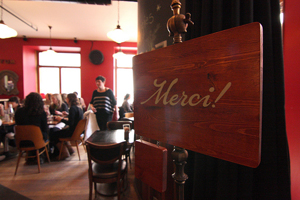 As part of that effort, s’il vous plait (please!) do not stick a computer, telephone or some other translating device in the face of a person with whom you are having trouble communicating, as if they are the idiot who cannot understand what you can only say in English.
As part of that effort, s’il vous plait (please!) do not stick a computer, telephone or some other translating device in the face of a person with whom you are having trouble communicating, as if they are the idiot who cannot understand what you can only say in English.
The devices, while easy for you to use, can seem insulting even if it seems the perfect solution. Parisians will probably not think them so parfait (par-fay, perfect). Practice with these devices at home or in your private room in Paris, not on the street or in a store. Merci, beaucoup!
Photo 1 by Jonathan Lundqvist [CC BY 2.0] via Flickr
Photo 2 by phalenebdlv [CC BY 2.0] via Flickr
Photo 3 by Sam Howzit [CC BY 2.0] via Flickr
More in French language, learning French
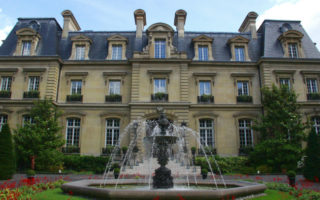

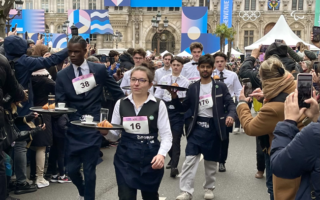
REPLY